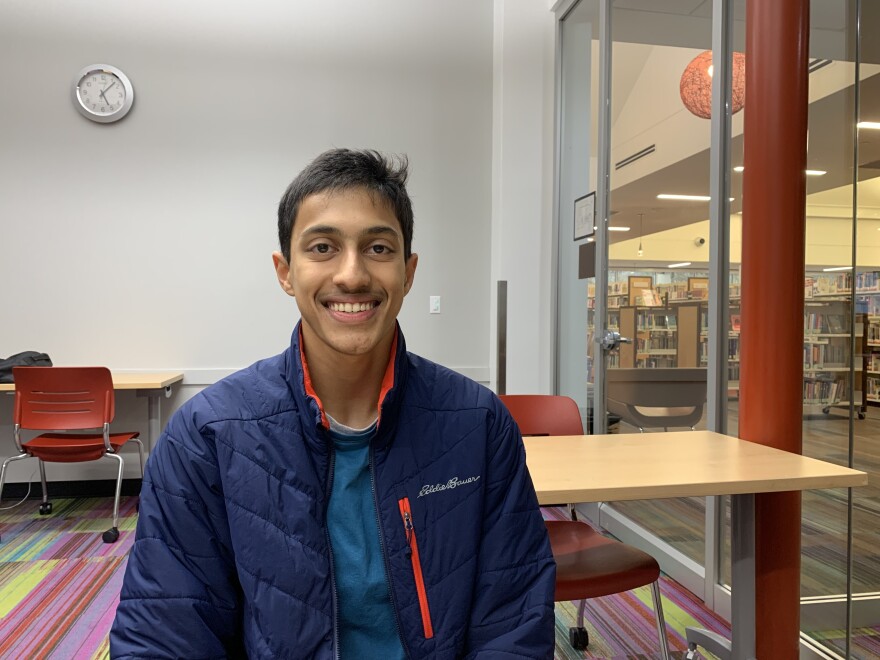Like a few hundred other science scholars picked for national recognition this year, 17 year-old Neil Song could confuse most people by describing his research into technology that “deconstructs spatiotemporal pose sequences separately into spatial graphs and temporal windows.”
But he won’t do that.
In explaining what his project’s about and where it came from, the St. Mark’s high school senior will tell you in plain English.
“Just browsing through, like, all these research paper repositories, I happened upon a paper about sign language recognition,” Song says.
He chose that field for his project in the Regeneron Science Talent Search, an annual competition of thousands of talented young high school senior scientists and mathematicians.
Across the country, 300 students — like Song and five others in North Texas — are named scholars and awarded $2,000 for their project, with an additional $2,000 going toward their school.
Like most teens, Song has had lots of interests. He used to play viola in school, though it didn’t last long. He’s also a .
But he’s always had a knack for science. He built his own computer when he was 10, after giving his father a parts list of all he needed. He likes coding and writing apps — he’s written one designed to help recovering addicts keep to their recovery plan. And it’s an interest backed by both of his parents, who work in computer science.
This 2023 scholar, who hopes to attend Stanford University because of its reputation as a startup incubator, had already studied hand motions and movements in a lab class. In coming up with something to submit for the talent search, he connected that experience to his ongoing interest in language and artificial intelligence.
“It was still using the algorithms and techniques in the projects I've been doing before, right?” Song explained. “The grasp transfer and hand reconstruction, right? But it’s using it in a way that's kind of more beneficial, especially to a group that might be more underserved by technology.”
That underserved group would be the deaf and hard of hearing. Song’s project incorporated artificial intelligence and sign language to advance speech recognition. He also thinks his work could help others learn sign language — even though he doesn’t know it or use it himself.

The same motivation to help others appealed to 17-year-old Amav Khambete, another Regeneron scholar.
Khambete goes to Coppell High School, where he swims competitively. Both of his parents are from India, and he can speak and write in five languages, including Hindi and Marathi. He also speaks Japanese, which he taught himself over the span of four years. (He'll be able to use that knowledge if he makes his school of choice, Tokyo University.)
The high school senior says he's obsessively spent eight or nine hours in the lab, losing track of time and caring only about the research at hand. His passion project focused on neural circuitry, and how the brain perceives pain.
By studying how and why people feel pain, it could open up new possibilities for pain management — say, a drug less addictive than current medications to help chronic pain.
“Pain is a perception [that’s] formed in the brain through connections between neurons,” he said. “So I really wanted to visualize that and see if you can inhibit those neuronic interactions.”
The goal to change or improve our lives in some big way is a driving force behind this talent search, according to Maya Ajmera, president and CEO of , which helps oversee the annual search.
“We’re looking at young people in the talent pipeline who are going to solve the world’s most intractable problems from climate change to pandemics,“ Ajmera said.
In the 82 years of this talent search – sponsored first by Westinghouse then Intel, and now Regeneron – it has identified future Nobel prize winners, MacArthur geniuses, and even a four-time World Puzzle Champion.
But mostly, the contests finds kids – like Khambete – who just love life in a lab.
“It's so fun,” Khambete said. “I don't consider it work at all. Whenever I go to the lab, I lose track of time like, it's just the curiosity and the idea that you're developing these novel drugs that could be, one day, you know, be replacing opioids and being this really big thing. And testing those experiments and collaborating with people around the world. I feel like that's a dream job.”


